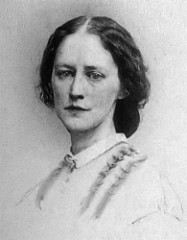Brevoort Place, August 8th, 1861.
Your response to my patriotic fervors gave me a sort of chill. We did not seem en rapport. . . . We are heartily ready to record our faith that the war is worth what it may cost, although the end may be only–only! the preservation of the Government, and not, just now, the liberation of the slaves. Perhaps you hold, with Mr. Phillips and Abby (I believe they comprise the entire party) that the war is not justifiable if it “means only stars and stripes.” We think, or to resume the perpendicular pronoun, I think that is enough for it to mean or seem to mean at present. “The mills of the Gods grind slow,” you know, or, if you will let me requote to you your own quotation, “you cannot hurry God.” Don’t you and Mr. Phillips want to hurry Him a little? I would rather, for my part, think with Mrs. Stowe, that the question of the existence of free society covers that other question, and that this war is Eternally Righteous even if it “means only the stars and stripes.” .. . We are all getting bravely over the two or three dreadful days of a fortnight ago, and coming to think that our retreat under the circumstances was not such a bad thing after all. . . . Monday after Bull Run was a frightful day in Washington. Georgy says a thick gloom oppressed them which the knowledge of the safety of those nearest them could not lighten in the least, and that a sad procession of the wounded was passing through the streets all day under the heavy rain. . . . Many of the men are but slightly wounded, and all are perfectly patient, cheerful and only eager for “another chance.” “Tell her about the wound in my hand preventing me from writing,” one man said, for whom Georgy was writing home. “And the wound in your leg?” G. asked. “No, never mind about that.” “And I shall say you fought bravely?” “Oh, no matter about that; she’d be sure of that.” They have known two or three cases of Southern barbarity to our wounded. But the poor wretches expected the same thing at our hands. Dr. Bacon, an intimate friend who has just come home with his regiment, Connecticut 2nd, says in the battle on Sunday he came upon a piece of shade in which four or five wounded Georgians were lying, and what was very painful to him, every man believed that he had come to kill them, lying there disabled. One young fellow called out, “Don’t hurt me, I’m hurt enough already,” and the rest made a feeble show of defending themselves. Of course he dressed their wounds, and did what he could for them with more than usual care and gentleness, and I can bear witness how careful and gentle that must have been, but it was hard to tell which emotion was uppermost with them, gratitude or astonishment. Mr. Maclise, of the 71st, which has come home, says he found a wounded man under a tree, a Carolinian, he thinks, who begged for his life in the same way. “Bless your soul,” Maclise said, “I wouldn’t hurt you for the world; don’t you want some water?” The poor fellow eagerly took the water from his enemy’s canteen. “If I only had a cup I could give you some brandy,” Mr. M. added. “Oh, just look in my knapsack and you’ll find a cup.” So Maclise opened the knapsack, took out a beautiful silver cup, mixed the draught, and made his patient as comfortable as he knew how, bringing home the silver cup, at the Carolinian’s most urgent entreaty, as a souvenir of that sad day. He will try and return it one of these days. But what a blackness of darkness, of falsehood and misrepresentation lies behind all this. These perfectly intelligent men devoutly believed that we would kill them, unarmed, sick and helpless! . . . The “prevailing” Prince comes and goes, and nobody seems to care much about it. We have learned something, or it is that we have too many troubles of our own to care for the pleasures of princes. He overstayed his time at Mount Vernon the other day, and there was a splendid story that he had been captured, but he spoiled the bulletins and the joke by coming back to a soiree at two o’clock at night. . . . We are going, as much for duty as pleasure, to Lenox, to-morrow or Saturday, for a few weeks, to refresh ourselves for the winter. As long as McClellan keeps quiet we shall stay. He resigned one day last week. Col. Davies dined with us yesterday and told us so, from his uncle, General Mansfield, who had seen the letter. The administration attempted some interference in his reforms, and he sent in his resignation. It was immediately hushed up, refused, of course, and he was allowed to have his way.
